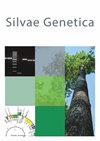Genetic diversity and mating system of Euterpe precatoria in three localities along the lower Solimões River in Central Amazonia
IF 1
4区 农林科学
Q3 FORESTRY
引用次数: 0
Abstract
Abstract Euterpe precatoria is a Neotropical palm from South and Central America and is hyperdominant in Amazonia, where it is increasingly important in the Brazilian market for açaí. Genetic diversity, population structure and mating system of E. precatoria were characterized with 10 microsatellite markers in three localities (Codajás, Manacapuru, and Manaquiri) along the lower Solimões River, Amazonas, Brazil. Leaves of 63 mature palms were collected, as well as fruits from 30 of these to analyze 20 seedlings per progeny. Genetic differentiation across localities was substantial (GS′ = 0.304) for mature palms, suggesting that gene flow is restricted between localities due to isolation by distance. Inbreeding was significant in progenies from all populations (ranging from 0.059–0.076), but not for mature palms, suggesting selection for heterozygosity during maturation to the adult stage. The outcrossing rate was high (0.917–1.0), confirming that the species is predominantly allogamous. Matings were not random due to the occurrence of biparental inbreeding (0.021–0.079) and correlated matings (0.059–0.424), so open-pollinated progenies present mixtures of self-sibs, half-sibs, full-sibs, and self-half-sibs, resulting in mean effective population size within progenies (2.23–3.06) lower than expected for a random mating population. The mating system’s characteristics are those expected in a predominantly allogamous hyper-abundant palm and suggest that human management of these often-anthropogenic populations is unlikely to reduce genetic diversity in the short term if done in situ, as practiced by Indigenous Peoples and local communities. Intensification will require careful attention to maintain genetic diversity.中亚马逊Solimões河下游三个地区欧洲食肉动物的遗传多样性和交配系统
Euterpe precatoria是一种来自南美洲和中美洲的新热带棕榈,在亚马逊地区占主导地位,在巴西市场açaí中越来越重要。利用10个微卫星标记,对巴西亚马逊河下游Solimões河流域3个地点(Codajás、Manacapuru和Manaquiri)的褐飞禽(E. precatoria)遗传多样性、种群结构和交配系统进行了分析。收集了63棵成熟棕榈树的叶子,以及其中30棵棕榈树的果实,以分析每个后代的20棵幼苗。成熟棕榈的遗传差异显著(GS′= 0.304),表明由于距离隔离,基因流动在不同地方之间受到限制。所有种群的后代近亲交配显著(范围为0.059 ~ 0.076),但成熟棕榈的后代近亲交配不显著,表明在成熟到成虫阶段存在杂合性选择。异交率高(0.917-1.0),表明本种以异交为主。由于双亲本近交(0.021 ~ 0.079)和相关交配(0.059 ~ 0.424)的存在,交配不是随机的,因此开放授粉的后代存在自兄妹、半兄妹、全兄妹和自半兄妹的混合,导致后代内的平均有效群体大小(2.23 ~ 3.06)低于随机交配群体的预期。交配系统的特征是在一个主要的异种繁殖的棕榈树中所期望的,这表明人类对这些通常是人为的种群的管理如果在原位进行,就像土著人民和当地社区所做的那样,不太可能在短期内减少遗传多样性。强化将需要仔细注意保持遗传多样性。
本文章由计算机程序翻译,如有差异,请以英文原文为准。
求助全文
约1分钟内获得全文
求助全文
来源期刊

Silvae Genetica
农林科学-林学
CiteScore
2.20
自引率
10.00%
发文量
10
审稿时长
3 months
期刊介绍:
Silvae Genetica is an international peer reviewed journal with more than 65 year tradition and experience in all fields of theoretical and applied Forest Genetics and Tree breeding. It continues "Zeitschrift für Forstgenetik und Forstpflanzenzüchtung" (Journal of Forest Genetics and Forest Tree Breeding) founded by W. LANGNER in 1951.
 求助内容:
求助内容: 应助结果提醒方式:
应助结果提醒方式:


